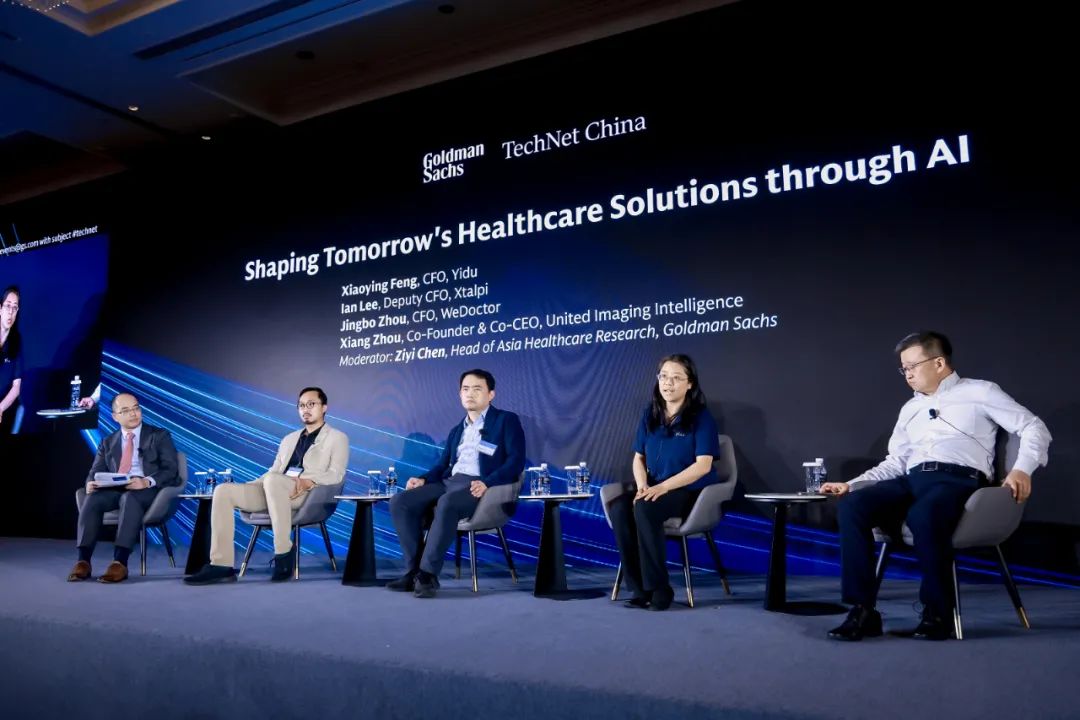Yidu Tech CFO Feng Xiaoying Attends TechNet Conference, Elaborates on How YiduCore Bridges the "Data-Algorithm-Scenario" Loop
2025-06-20

Breaking Through in the Deep Waters of Industry Transformation
From top-tier hospitals announcing localized deployments of DeepSeek to the rollout of AI doctors and AI assistants, this year has seen a critical turning point in healthcare, long considered one of the most challenging sectors to transform. The healthcare industry, plagued by long-standing imbalances in resource supply and demand, has embraced AI as a definitive solution to tackle the "impossible triangle" of quality, cost, and accessibility.
The deep application of AI technology fundamentally relies on high-quality data. However, data challenges have become a major roadblock for the industry: statistics from the National Health Commission's Information Center show that in 2020, the effective utilization rate of medical data in China's tertiary hospitals was less than 20%. A recent Deloitte report also indicated that globally, only 3% of hospital-generated data is utilized. When vast amounts of medical data become isolated "data silos," the implementation of technology faces the dilemma of having "no rice to cook."
Against this backdrop, the value of Yidu Tech's "AI Healthcare Brain," YiduCore, becomes clear. By establishing a dynamic cycle of "data-driven algorithms, algorithm-empowered scenarios, and scenario-fed data," it forms a self-reinforcing flywheel, precisely addressing the disconnect between data and technology.
Ms. Feng Xiaoying explained in detail that massive, high-quality medical data is the cornerstone for algorithm training and optimization. YiduCore has processed and analyzed over 5.5 billion authorized medical records, covering a network of more than 2,800 hospitals, continuously driving algorithms toward greater precision and intelligence. Meanwhile, the evolving algorithm models are deeply applied to specific healthcare scenarios such as clinical decision support, drug development, hospital management, and public health, solving real-world problems, improving efficiency and accuracy, and unlocking the value of data. Widespread application in real-world scenarios, in turn, generates new, high-quality data, providing "fuel" for the next round of algorithm iteration.
This three-dimensional breakthrough—combining "data scale, scenario depth, and algorithm precision"—has carved out a pathway from data elements to intelligent applications in an industry where data utilization rates are generally low, offering a new paradigm for overcoming the challenges of implementing medical AI.
Addressing Pain Points in Scenarios
Comprehensive Hospital Intelligence: Ms. Feng Xiaoying pointed out that in the wave of healthcare intelligence, the technical characteristics of large-model multi-task engines make it possible for medical institutions to achieve comprehensive intelligence. However, applying large models in healthcare scenarios faces numerous challenges, such as managing multiple types of large models uniformly, fine-tuning models with hospital data, ensuring the effectiveness of knowledge base retrieval to avoid hallucinations, and integrating traditional AI technologies with data. Yidu Tech's AI platform addresses these issues by unifying the management of diverse models, connecting hospital data with knowledge bases, and integrating large models with traditional AI technologies, helping hospitals build a solid intelligent foundation and master autonomous AI capabilities—truly "teaching them to fish."
Currently, Yidu Tech's AI platform has completed its first batch of deployments in 30 renowned tertiary hospitals across China. Its innovative "software-hardware integration, training-inference unification" architecture enables medical institutions to achieve "agile innovation"—reducing medical record writing from a traditional 5-minute manual task to 30 seconds with AI, cutting TNM staging assessment time by 70%, and allowing doctors to create their own customized AI assistants in just 1 minute. Its powerful scenario adaptability connects pre-diagnosis, diagnosis, and post-diagnosis healthcare services.
Clinical Trial Efficiency: Clinical trials are a critical phase in drug development and approval, representing the primary basis for evaluating new drugs and the most resource- and time-intensive stage of the process. Challenges include high manual costs for patient screening, difficulties in standardizing multi-center data, and lengthy cycles for generating regulatory evidence. Yidu Tech addresses these bottlenecks by developing tailored solutions and a series of intelligent applications for each stage of clinical trials, achieving full-chain AI integration and exponentially improving research efficiency. For example, the iRecruitment intelligent patient recruitment system reduces manual configuration costs by over 90%, while the iEDC solution automates the entire data collection and statistical process, breaking the deadlock in clinical trial data management.
Inclusive Health Management: Facing challenges such as fragmented regional data in inclusive insurance, insufficient precision in risk control, and low product personalization, Yidu Tech leverages YiduCore to accurately predict urban population health risks. Through intelligent insurance product design, it achieves inclusive pricing while ensuring sustainability. To date, Yidu Tech has deeply participated in the development and operation of inclusive insurance projects in 12 cities across 4 provinces, including Beijing and Shenzhen, serving over 34 million insured users and providing security for countless families. Additionally, Yidu Tech combines traditional treatment with out-of-hospital management and lifestyle interventions using technologies like large models and digital therapeutics. Its diabetes digital therapy has been successfully implemented in areas such as Lingshui, Hainan, and Tianjin Economic Development Zone, with ongoing exploration of digital therapies for conditions like Alzheimer's and weight management.
From activating healthcare data elements to deep penetration in clinical scenarios, from intelligent hospital infrastructure to inclusive health management, Yidu Tech's practices demonstrate that the ultimate value of medical AI lies in breaking technological silos to enable full-chain empowerment, overcoming geographical barriers to build equitable services, and continuously iterating technological capabilities to meet real-world health needs.
"Intelligent healthcare transformation requires building an industrial ecosystem of 'compliant data circulation, collaborative technological innovation, and diversified scenario validation,'" Ms. Feng Xiaoying stated at the conference. "Yidu Tech will always define technological boundaries based on clinical needs and validate innovation through scenario value, ensuring AI truly becomes a 'smart assistant' for doctors, a 'health manager' for patients, and an 'efficiency engine' for the industry."
本文为原创内容,仅供知识分享之目的,若存在侵权行为或疏漏,请与本平台联系,我们将及时处理。如需转载请后台留言,需征得本平台同意且注明来源转载。








